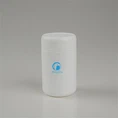Lutein is an important nutrient, belonging to the carotenoid family, which plays many important roles in human health.
First, protect the eyes
Prevention of retinal diseases
The retina is an important part of the eye that receives light and converts it into nerve signals. Lutein is concentrated in the macular region of the retina, which is responsible for our central vision and color perception. Lutein is like a natural "sunglasses" that absorbs a lot of blue light. Blue light is a kind of high energy visible light, mainly from sunlight and electronic device screens, too much blue light will cause oxidative damage to the retina. Lutein filters blue light and reduces its damage to retinal cells, thereby reducing the risk of age-related macular degeneration (AMD). AMD is one of the leading causes of blindness in the elderly.
At the same time, lutein can also prevent retinopathy, for diabetic patients, high blood sugar will cause eye microvascular disease, affecting the normal function of the retina. Lutein helps maintain the integrity of retinal microvessels and reduces the degree of diabetic retinopathy.
Relieve eye fatigue
After using electronic devices (such as computers, mobile phones) or reading for a long time, the eyes are prone to fatigue, dry, sore and other uncomfortable symptoms. Lutein can improve blood circulation to the retina, provide adequate nutrients and oxygen to the retinal cells, and help alleviate eye fatigue. Moreover, it can enhance the photosensitive performance of the retina, so that the eye can better adapt to various light environments and reduce visual discomfort caused by changes in light.
Improve vision
For vision loss caused by some eye diseases, such as amblyopia, lutein can not be completely cured, but it can play a role in assisting improvement. It can promote the regeneration of rhodopsin in retinal cells, a light-sensitive substance in the retina that is essential for the formation of vision. Appropriate lutein supplementation can improve visual acuity, especially in low light environments, helping to improve visual clarity.
Second, antioxidant effect
Scavenging free radicals
The human body will produce free radicals in the process of metabolism, at the same time, external environmental factors such as ultraviolet light, pollution, radiation, etc., will also promote the production of free radicals. Free radicals have a high degree of chemical reactivity and will attack various biological molecules in human cells, such as DNA, proteins and lipids, resulting in cell damage and aging. Lutein has a powerful antioxidant function, it can provide electrons to free radicals, make them inactive, thereby reducing the oxidative damage of free radicals to cells, protect the normal structure and function of cells.
anti-aging
Because lutein can effectively remove free radicals, it also plays a role in delaying the overall aging process in the human body. It not only protects the eyes, but is also good for other organs such as the skin. In the skin, for example, free radicals can damage collagen and elastic fibers, leading to sagging skin and wrinkles. Through antioxidant effects, lutein can reduce the oxidative damage of the skin, maintain the elasticity and luster of the skin, and make the skin look healthier and younger.
Third, the benefits of cardiovascular system
Reduces the risk of cardiovascular disease
Lutein can lower blood cholesterol and triglyceride levels. High cholesterol and triglycerides are major risk factors for atherosclerosis, which thickens and hardens blood vessel walls, affects blood flow, and increases the risk of cardiovascular diseases such as coronary heart disease and stroke. By regulating blood lipids, lutein helps to maintain the elasticity and patency of blood vessels and reduce the incidence of cardiovascular diseases.
Improve vascular endothelial function
Vascular endothelial cells play a key role in regulating vascular tension and preventing thrombosis. Lutein can promote the release of nitric oxide by vascular endothelial cells, which can relax vascular smooth muscle, dilate blood vessels, reduce blood pressure, inhibit platelet aggregation and prevent thrombosis, thus playing a protective role in the cardiovascular system.
The role of lutein
Jan 02, 2025Leave a message
Send Inquiry
















